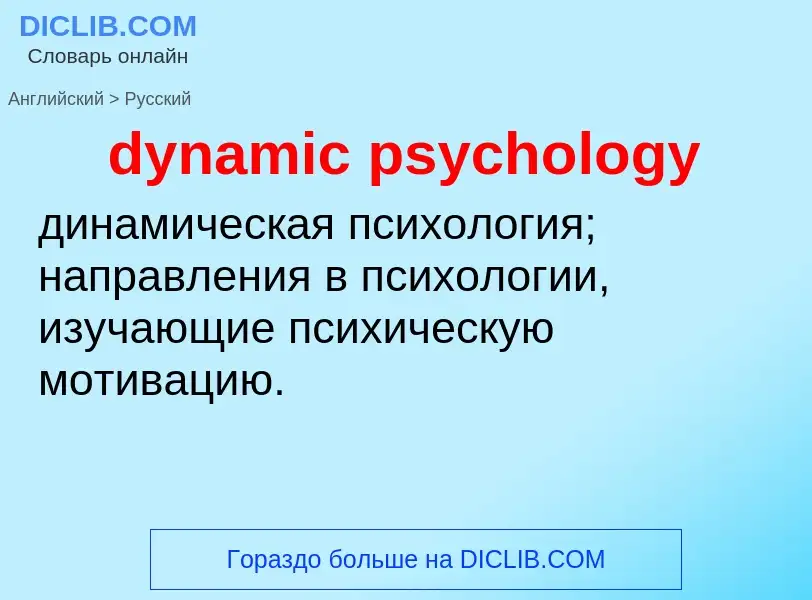Μετάφραση και ανάλυση λέξεων από τεχνητή νοημοσύνη
Σε αυτήν τη σελίδα μπορείτε να λάβετε μια λεπτομερή ανάλυση μιας λέξης ή μιας φράσης, η οποία δημιουργήθηκε χρησιμοποιώντας το ChatGPT, την καλύτερη τεχνολογία τεχνητής νοημοσύνης μέχρι σήμερα:
- πώς χρησιμοποιείται η λέξη
- συχνότητα χρήσης
- χρησιμοποιείται πιο συχνά στον προφορικό ή γραπτό λόγο
- επιλογές μετάφρασης λέξεων
- παραδείγματα χρήσης (πολλές φράσεις με μετάφραση)
- ετυμολογία
dynamic psychology - translation to ρωσικά
[saikəudai'næmik]
медицина
психодинамический
прилагательное
общая лексика
психодинамический
связанный с мотивацией или побуждениями
[saikəudai'næmiks]
медицина
психодинамика
существительное
общая лексика
психодинамика
(бессознательные) побуждающие силы
Ορισμός
Βικιπαίδεια

Psychodynamics, also known as psychodynamic psychology, in its broadest sense, is an approach to psychology that emphasizes systematic study of the psychological forces underlying human behavior, feelings, and emotions and how they might relate to early experience. It is especially interested in the dynamic relations between conscious motivation and unconscious motivation.
The term psychodynamics is also used to refer specifically to the psychoanalytical approach developed by Sigmund Freud (1856–1939) and his followers. Freud was inspired by the theory of thermodynamics and used the term psychodynamics to describe the processes of the mind as flows of psychological energy (libido or psi) in an organically complex brain.
There are four major schools of thought regarding psychological treatment: psychodynamic, cognitive-behavioral, biological, and humanistic treatment. In the treatment of psychological distress, psychodynamic psychotherapy tends to be a less intensive (once- or twice-weekly) modality than the classical Freudian psychoanalysis treatment (of 3–5 sessions per week). Psychodynamic therapies depend upon a theory of inner conflict, wherein repressed behaviours and emotions surface into the patient's consciousness; generally, one's conflict is unconscious.


![[[Ernst von Brücke]], early developer of psychodynamics [[Ernst von Brücke]], early developer of psychodynamics](https://commons.wikimedia.org/wiki/Special:FilePath/Ernst willhelm von bruecke.jpeg?width=200)
